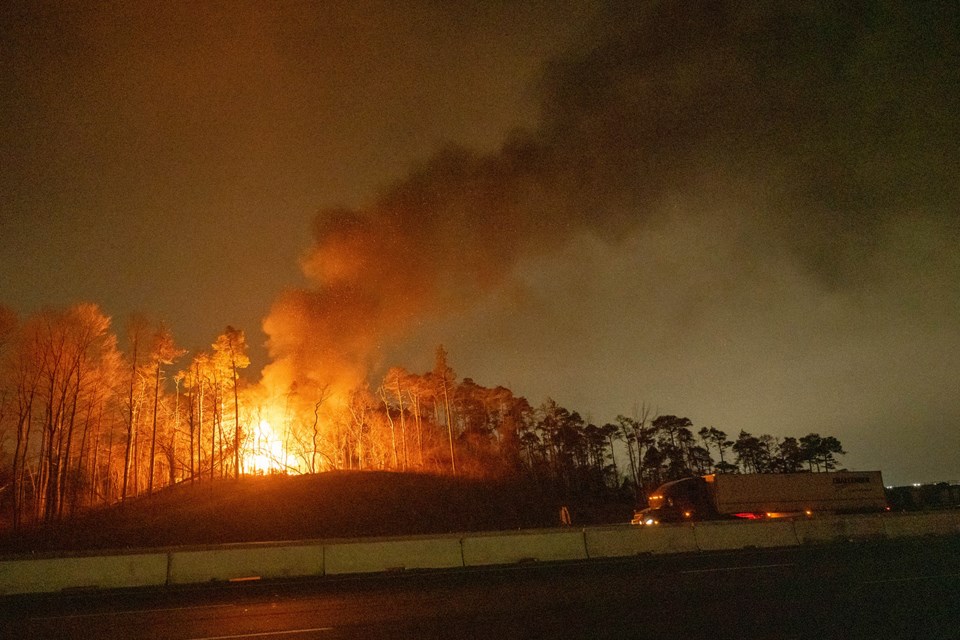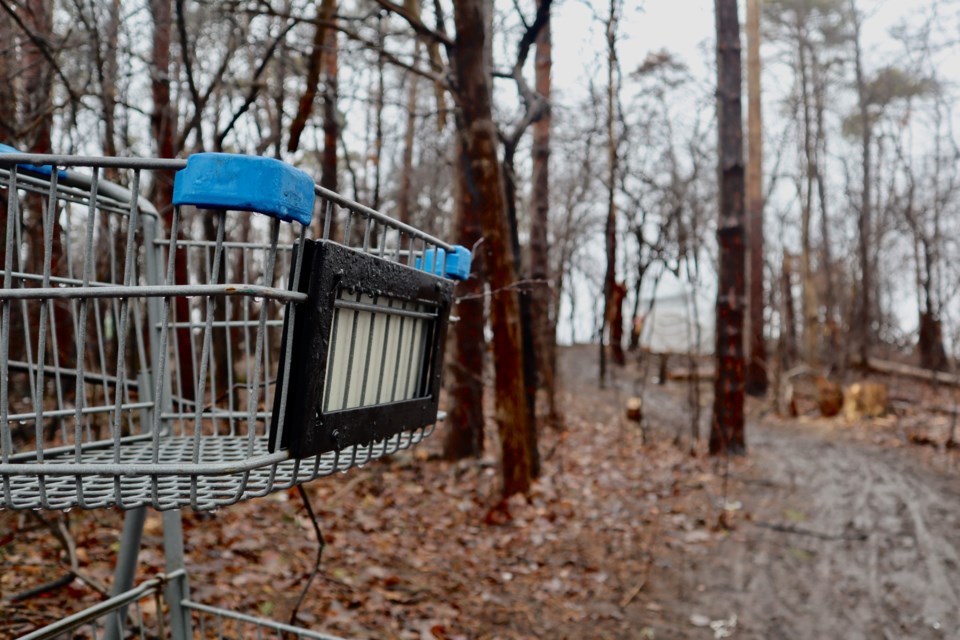Another large encampment has been removed from city-owned property due to "safety concerns."
The large camp at 130 Hollywood Crt. could be seen on the hills next to the 401 near the Franklin Boulevard exit, but one day late last month it was gone.
The City of Cambridge confirmed in an email to CambridgeToday that the camp was removed due to "safety concerns."
"We continue to monitor this location for health and safety concerns for individuals on-site and the surrounding community, ensuring individuals are supported and connected," wrote Elisabeth Slusarczyk, acting manager of municipal bylaw compliance.
"We recently conducted a cleanup at the location with the assistance of the individual on-site to ensure that the site remained clean and safe."
The camp made headlines in Jan. 2023 when a fire ripped through the camp, burning a wooden structure and multiple tents. The fire resulted in the closure of the 401 for several hours while fire crews extinguished the blaze.

Referring to several propane tanks found in the encampment, fire prevention officer Capt. John Percy said at the time, "each one of those canisters could act like a missile."
“If one of these were to explode and land on the highway, it would be a tragic day for sure," he said.
Slusarczyk said staff is working within the "current legal framework that has been established through the courts" regarding the unhoused community.
According to Julie Kalbfleisch, communications for Sanguen, the city relied on a building code bylaw that prevents unpermitted structures from being put up. The camp had been home to a few large structures that were standing for nearly two years.
"Given there are approximately 2,000 people living outside right now in Waterloo Region because there are not enough suitable shelter and housing options in our communities, it's not really surprising that people would try to build structures to keep warm," said Kalbfleisch in an email to CambridgeToday.
"Clearing encampments when there is literally nowhere to go, looking for ways to criminalize mental health, addictions and homelessness so that people will be forced into jail or treatment is deeply cruel and it flies in the face of our civic and moral responsibilities. We have to be better than that."
Sanguen added that forced evictions are not a solution to homelessness and these actions re-traumatize vulnerable individuals, disrupt access to critical medical care and social services and push people into more precarious and unsafe conditions.
"For service providers like Sanguen, these actions undo progress made in building relationships, connecting individuals to care and services while working towards stability. Outreach efforts become more difficult and valuable resources are strained as care teams must restart from scratch," said Kalbfleisch.
The City of Cambridge did not respond to request to clarify what the "legal framework" they are operating under or if anyone has returned to the site.
We went to 130 Hollywood Crt. and did not see any tents or other structures on the property.
The closure of the Hollywood Court encampment comes just weeks after another large camp was shut down and bulldozed by the City of Cambridge on Dundas Street. The city also relied on the building code to justify the clear out of that camp.
Legal experts who have been working in Cambridge to represent encampment residents say the city most likely violated a judge's 2023 decision barring municipalities from evicting camps on public property unless there is sufficient and adequate space in shelters.
"I would say at this stage they are probably not constitutionally compliant," said Ashley Schuitema, executive director of the Waterloo Region Community Legal Service.
She added preliminary results from a recent Point in Time count done by the region estimated there are more than 2,300 people living unhoused and there is nowhere near the required amount of shelter space to house everyone.
"The case is still valid and our case still stands for the proposition that if they want to clear the encampment, there needs to be accessible indoor shelter safe for people. And based on the most current Point in Time count, we know the number of people experiencing homelessness in our community doubled. There's no shelter space," she said.
Just last week, Ontario Premier Doug Ford announced he would introduce new legislation to give municipalities more power to clear encampments in their communities.
In a two-page letter to Ontario mayors, he said "Enough is enough," and that he is "confident" the measures in his proposed bill will be "common sense, practical and entirely aligned with the Charter of Rights and Freedoms."
He has also vowed to use the notwithstanding clause to override any courts that call the evictions a violation of constitutional rights.
Cambridge Mayor Jan Liggett has also been at the centre of the push for the province to increase municipal power when dealing with encampments. Since hand delivering a letter to Ford asking for provincial support, the city has now evicted two major encampments within city limits.
City staff declined to comment on whether the timing of Ford's support is linked to the recent evictions, but Schuitema thinks Ford's talk has emboldened the city to evict now and challenge later.
Slusarczyk maintains that the city's priority remains to address the complex needs of individuals experiencing homelessness while recognizing the "importance of providing dignified solutions and services while balancing the needs for a safe community."
"We continue to work together with our Regional and community partners to ensure all necessary supports are available to those affected and to connect them to more appropriate housing and community supports," she said.




